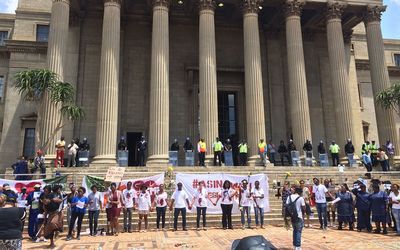Wits university’s Access Must Rise campaign offers a solution to only a few
by Thabiso Bhengu,
2016-02-25 06:10:07.0
I WOULD rather be at the University of Cape Town with Rhodes Must Fall, burning pictures of colonisers, than trying to raise R10m with the University of the Witwatersrand’s (Wits) student representative council (SRC). The campaign is called Access Must Rise and it is an initiative to assist the "missing middle" — students who are not poor enough for financial aid but not rich enough to afford university costs.
This campaign is a public call for donations, and it has obtained funds from corporates such as Nedbank and celebrities like Ifani and Cassper Nyovest, to mention a few. But fundraising is not sustainable. It also does not break the barriers to entry; rather, it gives a few people a ladder to cross them. The average cost of R100,000 a year for residence and tuition at Wits means we are fundraising for a mere 100 students.
This solution does ensure that the students who get financial aid this year will not be asking for donations again next year. The Access Must Rise campaign individualises a struggle that is racialised and gendered, and provides a solution to just a few. This is inefficient allocation of our own resources — in this case, our own bodies and ability to revolt and agitate for more.
When the Progressive Youth Alliance SRCs, made up of the African National Congress (ANC) Youth League, Young Communist League, South African Students Congress and Congress of South African Students, launched a campaign for students to go back to class after President Jacob Zuma announced that there would be no fee increment this year, the struggle got individualised.
Individualising a struggle is how you sell out. The SRCs in question were concerned that Fees Must Fall was tainting the image of their mother body, the ANC. This is why they withdrew from the fight against outsourcing labour. Therefore, the sentiments shared by Collen Maine about Fees Must Fall, as reported in the City Press, that the movement is "treason" should not surprise us. The fact that Wits is quiet while Rhodes Must fall is burning should not shock us at all.
The movement is still alive at Wits, but the heavy militarisation of the space and the complicity of the SRC in unsustainable packages such as payment plans, make it hard to galvanise numbers to put pressure on the university. It was only when the university was threatened that the university committed to economically beneficial decisions such as insourcing.
When Rhodes Must Fall erected a shack at UCT to protest the shortage of accommodation that was a demand to be humanised. However, the history of this country is that arrogance plays itself out every day. The shack was bulldozed by police, they demolished the shack like the rest of them in this country. UCT, like other institutions that maintain poverty, are embarrassed by the image of it. How dare these young people bring this reality to their faces? Even worse, how dare they light up images of the culprit that shaped this country?
The same resistance faced by those who called for the statue of Rhodes to fall is what those without accommodation are facing now. This means the public never fully grasped the discourse of symbolic violence. The understanding that having images of colonial rulers is violent. It is an announcement of who is truly welcome.
Sociologist Pierre Bourdieu posits symbolic violence as violence that is wielded with tacit complicity between its victims and its agents, insofar as both remain unconscious of submitting to or wielding it. The initiation of that consciousness for some is a beginning of their awakening and rising up to their humanity. For some the making of this moment is a painful reminder that PW Botha is not everyone’s hero.
This is why I would rather be at UCT ritually burning pictures of people who were complicit in designing my future before I was even conceived. A future of landlessness, a future of poverty where I have to think where am I going to get my registration money before the next month ends. I would rather be burning than waiting hopelessly to be among the lucky 100.
• Bhengu is studying economics and is an independent researcher at Wits

Picture: CHRIS THURMAN
I WOULD rather be at the University of Cape Town with Rhodes Must Fall, burning pictures of colonisers, than trying to raise R10m with the University of the Witwatersrand’s (Wits) student representative council (SRC). The campaign is called Access Must Rise and it is an initiative to assist the "missing middle" — students who are not poor enough for financial aid but not rich enough to afford university costs.
This campaign is a public call for donations, and it has obtained funds from corporates such as Nedbank and celebrities like Ifani and Cassper Nyovest, to mention a few. But fundraising is not sustainable. It also does not break the barriers to entry; rather, it gives a few people a ladder to cross them. The average cost of R100,000 a year for residence and tuition at Wits means we are fundraising for a mere 100 students.
This solution does ensure that the students who get financial aid this year will not be asking for donations again next year. The Access Must Rise campaign individualises a struggle that is racialised and gendered, and provides a solution to just a few. This is inefficient allocation of our own resources — in this case, our own bodies and ability to revolt and agitate for more.
When the Progressive Youth Alliance SRCs, made up of the African National Congress (ANC) Youth League, Young Communist League, South African Students Congress and Congress of South African Students, launched a campaign for students to go back to class after President Jacob Zuma announced that there would be no fee increment this year, the struggle got individualised.
Individualising a struggle is how you sell out. The SRCs in question were concerned that Fees Must Fall was tainting the image of their mother body, the ANC. This is why they withdrew from the fight against outsourcing labour. Therefore, the sentiments shared by Collen Maine about Fees Must Fall, as reported in the City Press, that the movement is "treason" should not surprise us. The fact that Wits is quiet while Rhodes Must fall is burning should not shock us at all.
The movement is still alive at Wits, but the heavy militarisation of the space and the complicity of the SRC in unsustainable packages such as payment plans, make it hard to galvanise numbers to put pressure on the university. It was only when the university was threatened that the university committed to economically beneficial decisions such as insourcing.
When Rhodes Must Fall erected a shack at UCT to protest the shortage of accommodation that was a demand to be humanised. However, the history of this country is that arrogance plays itself out every day. The shack was bulldozed by police, they demolished the shack like the rest of them in this country. UCT, like other institutions that maintain poverty, are embarrassed by the image of it. How dare these young people bring this reality to their faces? Even worse, how dare they light up images of the culprit that shaped this country?
The same resistance faced by those who called for the statue of Rhodes to fall is what those without accommodation are facing now. This means the public never fully grasped the discourse of symbolic violence. The understanding that having images of colonial rulers is violent. It is an announcement of who is truly welcome.
Sociologist Pierre Bourdieu posits symbolic violence as violence that is wielded with tacit complicity between its victims and its agents, insofar as both remain unconscious of submitting to or wielding it. The initiation of that consciousness for some is a beginning of their awakening and rising up to their humanity. For some the making of this moment is a painful reminder that PW Botha is not everyone’s hero.
This is why I would rather be at UCT ritually burning pictures of people who were complicit in designing my future before I was even conceived. A future of landlessness, a future of poverty where I have to think where am I going to get my registration money before the next month ends. I would rather be burning than waiting hopelessly to be among the lucky 100.
• Bhengu is studying economics and is an independent researcher at Wits























Change: -0.47%
Change: -0.57%
Change: -1.76%
Change: -0.34%
Change: 0.02%
Data supplied by Profile Data
Change: -1.49%
Change: 0.07%
Change: -0.47%
Change: 0.00%
Change: 0.04%
Data supplied by Profile Data
Change: 0.43%
Change: 1.19%
Change: 0.66%
Change: 0.15%
Change: 1.17%
Data supplied by Profile Data
Change: 0.06%
Change: -0.63%
Change: 0.00%
Change: -1.40%
Change: -0.87%
Data supplied by Profile Data